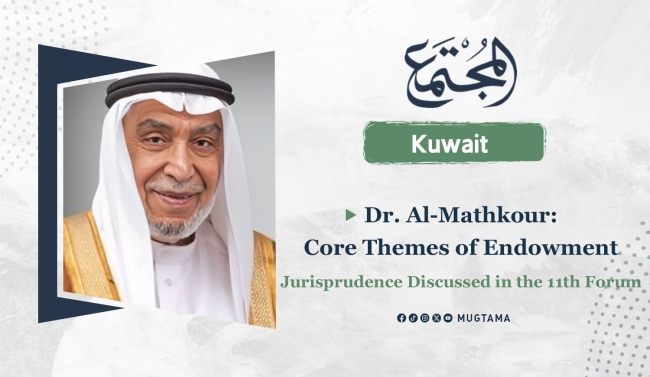Dr. Al- Al-Mathkour: Core Themes of Endowment Jurisprudence Discussed in the 11th Forum. Featured
The General Secretariat for Endowments is organizing the "Eleventh Forum on Endowment Jurisprudential Issues" from November 11 for three days in Istanbul, Turkey, under the slogan "Emerging Issues and Legal Foundations," in cooperation with the International Islamic Charitable Organization and the Turkish Directorate of Religious Affairs.
In his remarks on the preparations for the Eleventh International Forum on Endowment Jurisprudential Issues, the head of the scientific committee for the forum, Dr. Khalid Muthkur Al-Muthkur, stated that the committee has decided to delve into the pillars of successful endowments and discuss their issues between tradition and modernity; in order to develop and modernize, establish rules and guiding criteria to ensure the permanence of endowments without loss, impose principles of modern governance on their bodies, and support the choices of endowers and custodians in directing their expenditures.
He emphasized that the role of the scientific committee is to gather the scattered issues of endowments and place them on the research table in front of scholars, so they can express their opinions and reach appropriate legal solutions that aid endowment institutions in the Islamic world to gain jurisprudential insight and act according to what is mandated by Sharia.
Al-Mathkour added that the topics of the current forum are no less important than its predecessors, as the first topic, "Documenting Endowments... A Contemporary Legal Perspective," addresses issues related to the documentation and preservation of endowment deeds, such as the lack of clarity regarding the location of the endowment, the ambiguity of the deed's wording between endowment and others, the sale of endowment properties and their entry into documented ownerships without reference to the original deeds, the formulation of the endower's condition in an ambiguous vernacular not specified in the deed, the loss or damage of endowment deeds, the narrowing of endowment conditions without flexibility, which restricts the custodian's options in fulfilling the endower's condition, the lack of clarity regarding the fate of the endowment asset upon its completion, and the vagueness in the conditions set by the endower that govern the custodian's investment and growth of endowment funds, among other issues that required discussion and the establishment of scientific standards for guidance to endowers and endowment institutions worldwide.
Dr. Khalid Muthkur Al-Muthkur stated that the second topic examines "Governance Principles of Endowment Institutions," aiming to enhance the performance level of these institutions and develop practical models for their governance, making them more aligned with the nature of endowment work and its distinctive characteristics.
Dr. Khalid Al-Muthkur then clarified that the third topic is "Criteria for Prioritizing the Establishment of Endowments," aiming to establish controls that define for those in charge of official or private endowment institutions the rules and standards for prioritizing the establishment of endowments, and determining the uses of their proceeds according to their conditions, without competition among them, especially in light of the lack of regulations governing the prioritization of some over others, sometimes compounded by limited endowment resources, and the inability to accommodate conditional endowment expenditures as stated in endowment deeds. Additionally, there is a lack of clarity regarding these priorities even among the endowers themselves, who often overlook the immense reward for developing impoverished communities, believing that mitigating the harms of poverty outweighs the benefits of building mosques.
Al-Muthkur noted that previous forums have addressed extremely important topics and provided decisions and recommendations in this regard, confirming that the scientific committee has completed the preparation of the "Encyclopedia of Endowment Rules" to serve as a reference for the concerned parties regarding endowment affairs and issues. He commended the role of the General Secretariat for Endowments, which organizes the "Endowment Jurisprudential Issues Forum Project," highlighting its local, regional, and international leadership in endowment issues and its development and promotion of its sciences and studies.
On another note, and emphasizing the importance of coordinating efforts to hold this important endowment jurisprudential forum, the Kuwaiti Embassy in Ankara, represented by counselor Sultan Al-Aradah, visited the headquarters of the Directorate of Religious Affairs in the Republic of Turkey, where they met with Deputy President Dr. Selim Argun to discuss the best mechanisms to ensure the smooth conduct of the forum, expressing their gratitude to the Endowment Secretariat for its role in coordinating the efforts of Islamic countries in the field of endowments.
In conclusion, Dr. Khalid Muthkur Al-Muthkur extended his thanks to the General Secretariat for Endowments and its members, as well as to the esteemed members of the scientific committee for their efforts in making the forum successful. He also expressed gratitude to the Islamic Charitable Organization and the Presidency of Religious Affairs in the Republic of Turkey for their complete cooperation and participation in organizing the forum, wishing everyone continued success and guidance.


